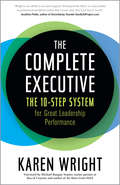- Table View
- List View
The Complete Engineering Manager: Build High-Performing Engineering Teams for Your Organization
by Ananth RamachandranTake a 360-degree tour of the engineering manager’s role and responsibilities. This book brings them to life with practical scenarios and references and ensures their relevance to your daily work. From upkeeping technical skills, to managing people and stakeholders, to ensuring timely deliverables, the job of the engineering manager is fast-paced, complex, and often short on learning resources. Fear not, this book has you covered with tips on managing evolving processes, delivering impactful projects in a timely manner, setting goals and priorities among product and technical initiatives, and helping your team focus and deliver. Business priorities are changing at a much faster pace than ever before with new technologies being introduced and adopted regularly. This book will help managers adopt modern practices to meet this moment and aid them in helping engineering teams succeed. The Complete Engineering Manager will leave you with a broader perspective and deeper skill set to apply to engineering management. What You Will Learn Employ the SELF framework for self-management and learn to build trust with team members Manage performance and craft individualized growth plans for employee success Evolve your team’s development, delivery, and technical processes to improve their efficiency Drive impact for your organization through prioritization, strategy and value delivery Build a high-performing engineering team with a strong and positive culture Who This Book is For New, aspiring, and experienced engineering managers who are looking for resources to address challenges in their role.
The Complete Executive: The 10-Step System for Great Leadership Performance
by Karen WrightBeing a leader requires much more than just understanding how to run a business. Today's executive is under an extraordinary set of demands, coming from multiple stakeholders and as such requires an extraordinary set of habits, practices, and disciplines in order to be able to not only succeed, but thrive, at the top. In The Complete Executive, long-time executive coach Karen Wright introduces a unique 10-step system that takes all of these aspects of leadership development into account. Leaders not only need incredible physical energy and stamina, they need a support system, a philosophy, a plan, business acumen, a social network, and a brand and reputation that will ensure they achieve their vision. Backed by an assessment tool, giving each leader a personal "report card," this book provides aspiring leaders with a framework to address all aspects of leadership that translates to peak performance. Wright knows from experience that even when everything is going well for leaders, high achievers don't stop there, which is why The Complete Executive is designed as a resource to return to again and again for continuous improvement.
The Complete Family Office Handbook
by Kirby RosplockEverything you need to know for successful wealth management for families Although the family office concept is not new, it is a phenomenon that is changing the wealth management landscape. With celebrities and business moguls, investment gurus and family business icons establishing private wealth management advisory firms, more and more individuals are asking what exactly is a family office and how does it operate? Family offices either serve one family exclusively or typically manage the wealth of a number of affluent families. If you're like most families and advisors, you're familiar with family offices, but may not know exactly how they work or why the family office is right for you or your clients. Dr. Kirby Rosplock, an expert on the family office concept, provides insights to some of the most common questions and even misperceptions in this handbook. The Complete Family Office Handbook explains how family offices operate, who should consider forming or joining one, and how to craft and set up a structure, purpose and vision for the office that fully serves a family's particular needs and investment goals. Whether you're a wealth creator, a member of a wealthy family considering forming or joining a family office, or a professional contemplating a career in this growing segment of the wealth management industry, this comprehensive guide provides insights to some of the most common questions and misperceptions.
The Complete Family Office Handbook: A Guide for Affluent Families and the Advisors Who Serve Them (Bloomberg Financial Ser.)
by Kirby RosplockDiscover new insights on how to setup, manage, and advise wealthy families and their family offices The Complete Family Office: A Guide for Affluent Families and the Advisors Who Serve Them, 2nd Edition represents the newest update to an essential series. This book prepares the members of wealthy families to collectively manage, sustain, and grow their wealth across multiple generations. It also assists professionals who advise families to better serve their needs. This book teaches those who advise family offices and wealthy families on: · How to setup, structure, and advise a family office · Current compliance, fiduciary and risk management practices for a family office · Forward-thinking investment management, estate planning, and private trust company considerations · Fresh insights on philanthropy, legacy, and impact investing · Best practices to managing family wealth education and preparing next generation owners · New insights on family governance, strategic planning, and succession · Methods to create a family constitution, mission, and vision for families and their family offices. The Complete Family Office Handbook provides the most comprehensive, current research, practical guidance, and approaches from leading family offices from around the globe and illustrates, by way of practical case studies and examples, how families can effectively manage their wealth for the long term.
The Complete Guide To Credit Repair
by Bill KellyWith more and more people declaring bankruptcy and total debt in this country rising, the time is perfect for a book like The Complete Guide to Credit Repair. Not only will this book show people how to repair bad credit to stay out of bankruptcy, it will show them how to avoid bad credit in the future and what they can do to strengthen their situation.Credit bureau information and other vital resources have all changed within the last few years. The Complete Guide to Credit Repair - written in a simple, straightforward tone - is packed with up-to-date information on a topic that millions of people face everyday.
The Complete Guide To Personal Finance: For Teenagers and College Students
by Tamsen ButlerIn this book, you will learn how to get and manage credit, how to make and stick to a budget, how to save for college, how to determine your needs versus your wants, how to pay for a car, how to finance college, how to manage risk, how to open a bank account, how to write a check, how to balance a checkbook, how to avoid the pressures of consumerism, and how to avoid financial mistakes. You will also learn about investment options, taxes, checks, debit cards, credit cards, and basic budget tips. This book is filled with helpful suggestions from financial and family counselors, and you will discover creative ways to get a jumpstart on your financial future and use money responsibly. Even if you have had a few missteps along the way, you will be able to learn from your mistakes and get on the path to financial well-being.
The Complete Guide To Sarbanes-Oxley
by Stephen M. BainbridgeAs of the end of 2006, small businesses, which were once exempt, now have to comply with Sarbanes-Oxley (SOX). Under Sarbanes-Oxley, they will now be exposed to audits, reviews and will have to make their profits, losses, and compensation packages public.The Complete Guide to Sarbanes-Oxley will answer the following questions:How do companies comply with SOX?How does SOX effect relations within the firm?Should a public company go private to avoid SOX?The Complete Guide to Sarbanes-Oxley is a nontechnical, "plain English" guide for the managers and directors of the 13,000 publicly held corporations now subject to SOX. No business owner should be without it!
The Complete Guide To Sarbanes-Oxley: Understanding How Sarbanes-Oxley Affects Your Business
by Stephen M BainbridgeAs of the end of 2006, small businesses, which were once exempt, now have to comply with Sarbanes-Oxley (SOX). Under Sarbanes-Oxley, they will now be exposed to audits, reviews and will have to make their profits, losses, and compensation packages public.The Complete Guide to Sarbanes-Oxley will answer the following questions:How do companies comply with SOX?How does SOX effect relations within the firm?Should a public company go private to avoid SOX?The Complete Guide to Sarbanes-Oxley is a nontechnical, "plain English" guide for the managers and directors of the 13,000 publicly held corporations now subject to SOX. No business owner should be without it!
The Complete Guide for CPP Examination Preparation
by Anthony V. DiSalvatore (CPP PSP & PCI)Originally written by a team of Certified Protection Professionals (CPPs), Anthony DiSalvatore gives valuable updates to The Complete Guide for CPP Examination Preparation. This new edition contains an overview of the fundamental concepts and practices of security management while offering important insights into the CPP exam.Until recently the sec
The Complete Guide to Book Marketing
by David ColeCole, a longtime marketing consultant and previously marketing director of Nolo Press, explains why this is, and what authors, publishers, and self-publishers can do to make works stand out in the crowded marketplace. The revised edition includes low-risk strategies for book marketing in a tight economy (such as marketing reprints and backlist titles), discusses strategies for breaking into the education market, and looks at e-book marketing and print-on-demand.
The Complete Guide to Book Marketing
by David ColeWith an intense focus on strategy that won't be found in any other guide, this invaluable resource will be of immediate help to publishers, authors, and most anyone who wants to succeed in the publishing industry.Completely updated and expanded with an enhanced focus on selling outside traditional channels, The Complete Guide to Book Marketing features systematic, results-oriented approaches to reaching the largest amount of readers for the least amount of money. Readers will find no-nonsense advice for building a publishing identity, cultivating feedback from your audience, and implementing an effective publicity campaign. This new edition also features a brand-new section on marketing to the lucrative education market, as well as new information on e-book marketing, print-on-demand, and marketing backlist and reprint titles.
The Complete Guide to Book Publicity: Second Edition
by Jodee BlancoWritten by one of the country's leading publicists, this is an authoritative, in-depth guide to the unique form of publicity needed to successfully launch a book. Step by step, readers are coached through the stages of a book's publicity lifecycle. The nuts and bolts of book promotion are covered for fiction, nonfiction, hardcover trade, mass market, and trade paperbacks. A thorough "publicity toolbox" of sample press kits.
The Complete Guide to Business Risk Management
by Kit SadgroveRisk management and contingency planning has really come to the fore since the first edition of this book was originally published. Computer failure, fire, fraud, robbery, accident, environmental damage, new regulations - business is constantly under threat. But how do you determine which are the most important dangers for your business? What can you do to lessen the chances of their happening - and minimize the impact if they do happen? In this comprehensive volume Kit Sadgrove shows how you can identify - and control - the relevant threats and ensure that your company will survive. He begins by asking 'What is risk?', 'How do we assess it?' and 'How can it be managed?' He goes on to examine in detail the key danger areas including finance, product quality, health and safety, security and the environment. With case studies, self-assessment exercises and checklists, each chapter looks systematically at what is involved and enables you to draw up action plans that could, for example, provide a defence in law or reduce your insurance premium. The new edition reflects the changes in the global environment, the new risks that have emerged and the effect of macroeconomic factors on business profitability and success. The author has also included a set of case studies to illustrate his ideas in practice.
The Complete Guide to Business Risk Management
by Kit SadgroveRisk management and contingency planning has really come to the fore since the first edition of this book was originally published. Computer failure, fire, fraud, robbery, accident, environmental damage, new regulations - business is constantly under threat. But how do you determine which are the most important dangers for your business? What can you do to lessen the chances of their happening - and minimize the impact if they do happen? In this comprehensive volume Kit Sadgrove shows how you can identify - and control - the relevant threats and ensure that your company will survive. He begins by asking 'What is risk?', 'How do we assess it?' and 'How can it be managed?' He goes on to examine in detail the key danger areas including finance, product quality, health and safety, security and the environment. With case studies, self-assessment exercises and checklists, each chapter looks systematically at what is involved and enables you to draw up action plans that could, for example, provide a defence in law or reduce your insurance premium. The new edition reflects the changes in the global environment, the new risks that have emerged and the effect of macroeconomic factors on business profitability and success. The author has also included a set of case studies to illustrate his ideas in practice.
The Complete Guide to Buying and Owning a Recreational Property in Canada
by Douglas GrayPrime vacation property throughout Canada has doubled in value within the past five years. For the potential buyer of a vacation property, the cost of entry can be stiff. There is a high demand for many to own a vacation home or idyllic retreat for pleasure and lifestyle enjoyment, future retirement, rental revenue, or investment profit. But buying a recreational property can be a potential minefield for many reasons, as there can be complex tax, legal, estate planning, and investment issues to consider. When investing hundreds of thousands of dollars in a recreational property you will need to do your due diligence and seek solid advice. The Complete Guide to Buying and Owning Recreational Property in Canada, written by Canada's leading authority on matters related to real estate, offers valuable insights and tips, and will prove a trustworthy resource for many years to come. Topic areas include: Buying the right property, for the right reasons, in the right location How to set a purchase and financing strategy and how to negotiate your best deal How to exercise caution when buying with family or friends-and how to keep peace in the family when sharing use or ownership Getting the help of professionals, such as a tax accountant, lawyer, home inspector, mortgage broker, insurance broker, and realtor. Obtaining tax and estate planning strategic advice to save tax on transfer, sale or bequeathing of the property, or inheriting a property What you need to know if you are buying recreational property as an investment. Money saving tips when renting your property yourself or using professional rental management Special cautions if buying a vacation home or cottage outside of Canada Creative ways of using your vacation home or cottage for exchange or barter Key strategies to follow and classic pitfalls to avoid And much, much more! Plus Sources of Further Information, Key Websites, Checklists, Glossary, and Index.
The Complete Guide to Buying and Selling Apartment Buildings
by Steve Berges&“Berges shares a framework investors can use to make the transition from buying single-family homes to successfully investing in multifamily properties.&” —The Real Estate CPA, &“18 of the Best Books on Real Estate Investing&” Whether you&’re a first-time real estate investor or a seasoned professional, The Complete Guide to Buying and Selling Apartment Buildings helps you map out your future, find apartment buildings at a fair price, finance purchases, and manage your properties. Now revised and expanded, this Second Edition includes tax planning advice, case studies of real acquisitions, and appendixes that add detail to the big picture. Plus, it includes a handy glossary of all the terms investors need to know, helpful sample forms that make paperwork quick and easy, and updated real estate forecasts. With this comprehensive guide at hand you&’ll find profits easy to come by. &“If you&’re thinking about investing in apartment buildings, this is a good place to start.&” —Robert Bruss, nationally syndicated columnist
The Complete Guide to Conflict Resolution in the Workplace
by Marick F. Masters Robert R. AlbrightPeople thrive on conflict in most areas of their lives--football games, political debates, legal disputes--yet steer clear from workplace conflicts. However, conflict is a healthy way to challenge the existing order and essential to change in the workplace. The real problem is not conflict per se, but managing conflict.
The Complete Guide to Credit Repair
by Bill Kelly<p>With more and more people declaring bankruptcy and total debt in this country rising, the time is perfect for a book like <i>The Complete Guide to Credit Repair</i>. Not only will this book show people how to repair bad credit to stay out of bankruptcy, it will show them how to avoid bad credit in the future and what they can do to strengthen their situation. <p>Credit bureau information and other vital resources have all changed within the last few years. <i>The Complete Guide to Credit Repair</i> - written in a simple, straightforward tone - is packed with up-to-date information on a topic that millions of people face everyday.</p>
The Complete Guide to Credit Repair
by Bill Kelly Jr.The Complete Guide to Credit Repair written in a simple, straightforward tone is packed with up-to-date information on a topic that millions of people face everyday.
The Complete Guide to Cybersecurity Risks and Controls (ISSN)
by Dan Shoemaker Anne Kohnke Ken E. SiglerThe Complete Guide to Cybersecurity Risks and Controls presents the fundamental concepts of information and communication technology (ICT) governance and control. In this book, you will learn how to create a working, practical control structure that will ensure the ongoing, day-to-day trustworthiness of ICT systems and data. The book explains how to establish systematic control functions and timely reporting procedures within a standard organizational framework and how to build auditable trust into the routine assurance of ICT operations. The book is based on the belief that ICT operation is a strategic governance issue rather than a technical concern. With the exponential growth of security breaches and the increasing dependency on external business partners to achieve organizational success, the effective use of ICT governance and enterprise-wide frameworks to guide the implementation of integrated security controls are critical in order to mitigate data theft. Surprisingly, many organizations do not have formal processes or policies to protect their assets from internal or external threats. The ICT governance and control process establishes a complete and correct set of managerial and technical control behaviors that ensures reliable monitoring and control of ICT operations. The body of knowledge for doing that is explained in this text. This body of knowledge process applies to all operational aspects of ICT responsibilities ranging from upper management policy making and planning, all the way down to basic technology operation.
The Complete Guide to Fundraising Management
by Stanley Weinstein Pamela BardenThe real-world guide to successfully funding your nonprofit program The Complete Guide to Fundraising Management is the comprehensive handbook for successful fundraising, with a practical focus that applies across the nonprofit sector. With a focus on planning, self-assessment, continual improvement, and high-payoff strategies, this book provides more than just ideas—it shows you the concrete, real-world actions that make it all happen, and gives you the tools you need to bring these concepts to life. This new fourth edition features the latest information about social media campaigning, internet fundraising, crowdfunding, and more. Timelines, checklists, and forms help you streamline management tasks to focus on effective development, and updated sample reports and budget information help you begin implementing these approaches quickly. The nonprofit world is becoming increasingly competitive in terms of funding, and fundraisers are being asked to perform miracles more than ever before. This book offers a time-tested framework for fundraising success, with step-by-step guidance through the entire process from prospect to program. Understand and apply the major principles and best practices of fundraising Manage information, resources, development, and volunteers Adopt new approaches to relationship-building and prospect identification Write grants and fundraising materials that make a rock-solid case for support There is never enough funding to go around. To survive and thrive, nonprofits must revitalize interest and generate more support. Gone are the days of door-knocking and bake sales; strategy is critical, and execution must be top-notch. The Complete Guide to Fundraising Management shows you the real-world strategies that get your programs funded.
The Complete Guide to Fundraising Management
by Stanley WeinsteinThere are now more than 1 million nonprofit organizations in the United States, and the fundraising industry is one of the fastest-growing segments of the economy. The Complete Guide to Fundraising Management presents step-by-step guidance on planning, self-assessment, continual improvement, cost effective fundraising strategies and much more. An accompanying website contains checklists, grids, and sample forms. Plus, the Third Edition adds a chapter on internet fundraising as well as updated statistics. Fundraising professionals will benefit from the practical advice on managing the complexities of a development office.
The Complete Guide to Government Contract Types
by Kenneth R. SegelEverything You Need to Know About Government Contract TypesAs the world's single largest buyer of goods and services, the federal government has many ways to structure its procurements. Different situations and conditions often determine the best vehicle for a particular purchase. Contracting officers must assess a wide range of factors to determine which contract type will provide the government the best value and the least risk.The Complete Guide to Government Contract Types provides a comprehensive overview of the key government contract vehicles and types: fixed-price, cost-reimbursement, incentive, and other (which includes letter, indefinite-delivery/indefinite-quantity, and time-and-material contracts). The author first explains the selection process for contract vehicles, which is the basis for selecting the appropriate contract type for the work in question. He then presents a comprehensive, in-depth analysis of each contract type, explaining how each works best to meet certain types of requirements and conditions.This is an essential resource for both contracting officers and contractors seeking to understand and work effectively within the nuances of contract selection and compliance.
The Complete Guide to Hedge Funds and Hedge Fund Strategies
by Daniel CapocciOne-stop-guide to the hedge fund industry, investment and trading strategies adopted by hedge funds and the industry's regulation. For anyone with an interest in investing or managing funds, it presents everything practitioners need to know to understand these investment vehicles from their theoretical underpinnings, to how they work in practice.
The Complete Guide to Hiring and Firing Government Employees
by Stewart LiffNot only does government bureaucracy often make hiring a cumbersome, slow-moving process, but poor performers enjoy more protection from losing their jobs than their counterparts outside of government. With over thirty years’ experience as a federal government employee, insider Stewart Liff offers a solution to the government talent shortage--enabling government managers to cut through the red tape and take advantage of the best government employees out there. The Complete Guide to Hiring and Firing Government Employees also teaches readers the equally important skills of efficiently documenting and dealing with those who don't make the cut to ensure your team starts and stays strong. You’ll discover: how to take an anticipatory approach to recruiting; how to decide who to target, and where and how to advertise for open positions; how to screen and interview candidates; how to counsel a poor-performing employee; how to use progressive discipline; how to document a case and write a charge; how to develop internal political support; and much more. Bringing the best new people on board and weeding out the worst are both the most important and the most difficult tasks faced by any employer. For federal managers, the challenge is even greater. Filled with tried-and-true strategies, this step-by-step guide will equip you to continuously uphold, strengthen, and even grow an entire department of high achievers.





















